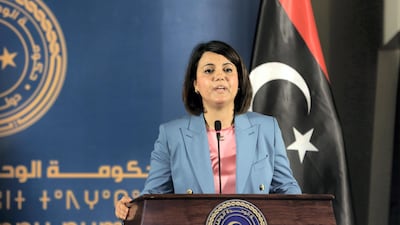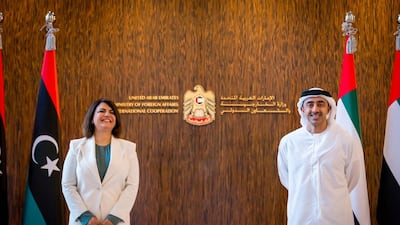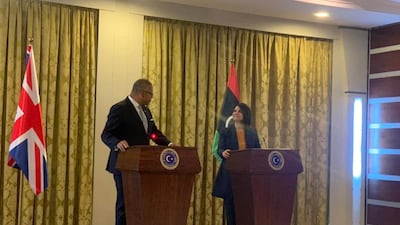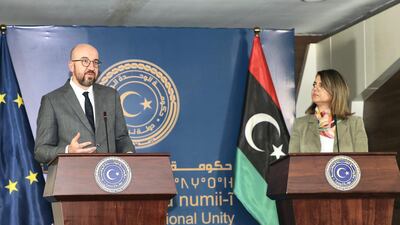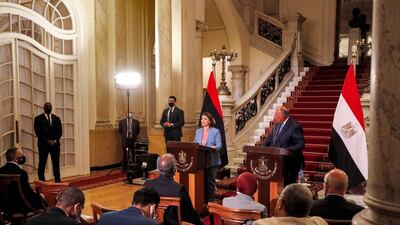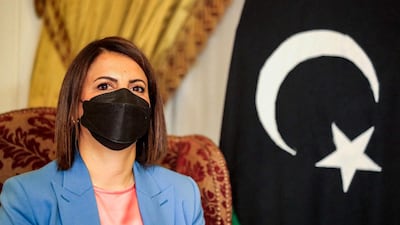Libya’s first female foreign minister is under pressure to shore up international backing for elections later this year amid the country’s fragile political landscape.
Najla El Mangoush has been interim foreign minister for 100 days, as of Tuesday, and has spent most of that time trying to enlist both local and regional support for peace plans in the oil-rich nation.
A former criminal and human rights lawyer, her diplomacy skills will be tested as she prepares to build consensus on Libya’s political future in Germany on Wednesday.
Ms Mangoush will meet global statesmen including US Secretary of State Antony Blinken and UN Secretary General Antonio Guterres at a summit in Berlin to discuss resolving Libya's political divisions.
It will follow weeks of meetings with various international players, including the UK and UAE, that aim to secure broad-based backing for the first election in Libya in seven years.
Three months after taking on her role at a critical juncture in her country's political development, the summit will cement Ms Mangoush's position in the global political arena.
Where to for Libya’s precarious politics?
In March, Libya’s parliament formed a Government of National Unity, led by interim prime minister Abdul Hamid Dbeibeh, 10 years after the Arab uprising began.
The fledgling government has already garnered widespread international support amid hopes it can bring lasting peace to a land plagued by hostility since the 2011 removal of Muammar Qaddafi.
Libya's last elections, in July 2014, were followed by a worsening of the existing social and political polarisation in the country. They gave rise to extremist movements and warring factions supported by foreign powers, including France and Turkey, at various stages.
The presence of outside forces has been a sticking point for reaching peace and the Libyan foreign minister has repeatedly called for the “withdrawal of all foreign forces and mercenaries”.
After publicly urging Turkey to “co-operate” over withdrawal from the country last month, Ms Mangoush was subjected to vitriolic personal abuse online. One militia group in Tripoli stormed a hotel formerly used by the unity government, in search of her.
For some, the aggressive reaction to her comments reflected an inability of some men in Libya to accept women in positions of political power. It was also an alarming reminder of the precariousness of women in public life in a country where many have been assassinated, including the renowned human rights lawyer Salwa Bugaighis in 2014 and activist Hanane Al Barassi last year.
Former lawyer returns to public life
Ms Mangoush was appointed as foreign minister after Mr Dbeibeh faced a backlash for backtracking on an earlier promise that 30 per cent of Libya’s new Cabinet posts would be filled by women.
She held a role in the transitional council that briefly governed Libya after its 2011 uprising, and was later joined by four other women in the Cabinet, including Halima Abdulrahman as justice minister.
Ms Mangoush joins a small number of female Arabs to become foreign minister in the region, including Mauritanians Al-Naha bint Hamdi in 2009 and Fatima bint Aswaina in 2015, and Sudan’s Asma Muhammad Abdullah in 2019.
Born and raised in the eastern city of Benghazi, she graduated from the Faculty of Law at the University of Benghazi in 2009. She taught and practised criminal law in the city before joining the staff at the National Transitional Council led by Mustafa Abdel Jalil in the early days of the Libyan revolution.
As head of the Public Engagement Unit at the NTC, Ms Mangoush was focused on the role of civil society and organised several large seminars aimed at bringing together the public and decision-makers with a collaborative, non-adversarial approach.
She later joined the US Institute of Peace in Washington, where, according to her LinkedIn profile, she provided “strategic guidance, direction and advice” within its Libyan Advisory Group.
A recipient of the prestigious Fulbright Scholarship, Ms Mangoush completed her MA in Conflict Transformation at Eastern Mennonite University in the US. She went on to study for her doctorate in Conflict and Peace Management from George Mason University in Virginia.
Described by the alma mater where she received her doctorate as a “trailblazer”, Ms Mangoush was the programme officer for Peacebuilding and Traditional Law at the Centre for World Religions, Diplomacy, and Conflict Resolution at George Mason when she was called to political office.
Ms Mangoush’s academic focus on war-to-peace transitions and restorative justice is undoubtedly useful in trying to coalesce a country fractured by years of civil war. Nevertheless, ending a conflict stoked by foreign intervention and interests will require international players to follow her lead.
Before the meetings in Berlin on Wednesday, the EU fired off a warning that anyone judged to be delaying the Libyan elections beyond December would be at risk of sanctions, a move that will hopefully strengthen Ms Mangoush’s hand at the summit.
